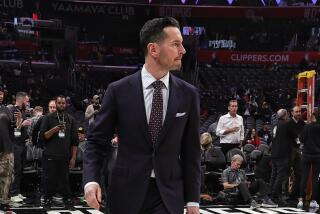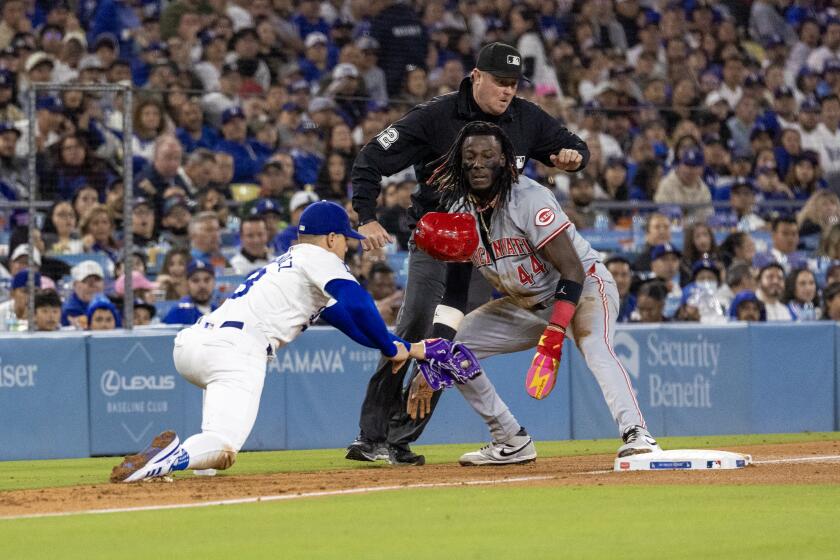Only Romania Could Find a Defect in This Survivor’s Game
Almost as long as he can remember, Jonny Casapu wanted to play tennis. He would watch Billie Jean King on television and know that this could be his sport as well.
Could be. Except for a few problems.
Casapu was the youngest of five children in a poor Romanian family living in Bucharest. His father died when Jonny was 5, leaving his mother, Vera, to support the family with various odd jobs.
Tennis wasn’t a big priority in those days in the three-room Casapu household.
There were other obstacles as well--like no courts and no rackets.
No matter.
The youngest Casapu made a crude paddle out of wood, drew the lines for a court on a street in his neighborhood and played with friends, taking care to keep the ball above the imaginary net in the middle of his homemade court.
One of the friends he played with was Ilie Nastase.
It was on a lakeside court near his home that Casapu first got the experience of playing with such luxuries as a net.
He was 13 and still didn’t have a racket. So he went out with his trusty old paddle and often defeated people who had more traditional tennis equipment.
Finally, Casapu got his talented hands on a racket, but couldn’t deal with such an elegant weapon at first. Unaccustomed to its power and precision, Casapu would swing and watch the ball sail into the lake. Soon, though, he was placing the ball right where he wanted.
It was then that Casapu came to the attention of a local coach, Constantin Chivaru.
“I want you to play tennis for me,” Chivaru told Casapu.
The youngster, also an avid soccer player, wasn’t ready to make a choice between the two sports.
“If you play for me,” Chivaru said, “I’ll give you chocolate.”
A tennis career was born.
Casapu and Nastase both began playing for a Bucharest athletic club. Run by the military, the club had facilities for everything from swimming to tennis.
At 15, Casapu won the junior championship of Romania. Playing for the Steaua (star in Romanian) club, Casapu and Nastase were the leaders as Steaua won the team championship of Romania three straight years.
By 1970, Casapu was good enough to leave his native country for the first time to go on tennis missions. He was on a team that finished third in the Galea Cup in Paris. The next year, Casapu went to Yugoslavia to represent his country in Davis Cup play. The team of Nastase and Casapu won in doubles competition and Romania emerged the overall victor.
The days of the wood paddle were long gone. The days of glory seemed just around the corner.
Instead, however, around the corner came a speeding car.
Casapu, a passenger in a friend’s vehicle, was seriously injured in 1972 back in Romania when the pair was broadsided by another car. Casapu suffered shoulder and knee injuries. It took him three years to recover and, by then, it seemed his country had forgotten him.
“While I had been out, younger players had come in to take my place,” Casapu says. “I wanted to go out and play in other countries, but I couldn’t get a passport. They were sending other players. I was stuck in Romania playing the same people all the time. I knew I would never get stronger that way.”
Six years after the accident, Casapu finally got his chance. He decided to make the most of it.
Sent to West Germany to play in 1978, Casapu walked into a police station, asked for and was granted political asylum.
“It was a tough decision,” he says. “But I had wasted so much time, so much, I knew I would never do that again, never sit around and wait. I had to leave my mother and my brothers and sister. The choice was between freedom and family. I chose to be free.”
Having just turned 28, Casapu figured he could still make up for all the lost years, still claim what he saw as his rightful spot among the world’s elite players.
Again his luck soured. Again he took a disastrous car ride.
Traveling with a friend in West Germany, Casapu lit up a cigarette. What he didn’t know, however, was that a can of gasoline had been tucked under the seat. There was an explosion. Casapu was thrown from the car, bad burns searing his flesh all the way up his left leg.
This time, it took him six months to recover. His tennis game would never recover.
“It was too late to be a world-class player at that point,” he says. “I had wasted too much time.”
The highest he had ever been ranked was 154th in the world. He had played all over Europe and won some small tournaments, but never quite crashed into the big-time.
He decided to go to “my dream country,” America, in 1980, and heal his damaged flesh in the heat and warmth of Hawaii. He got a job there teaching tennis, taught himself the language and became a U.S. citizen last year.
Jonny Casapu, 35, now lives in Tarzana. Doug Howe, general manager of the nearby Braemar Country Club, has hired him to be one of the club’s four resident pros. Casapu also plans on going back on the circuit, playing in the 35 and older category.
Looking at him, relaxing and joking with club members, whipping his still powerful serve past helpless opponents, dazzling the ladies with a behind-the-back passing shot, it’s easy to forget the torturous road he took to get here.
But what the heck, life could be a lot worse. After all, somebody’s still paying him to play tennis and he doesn’t even have to bring his own paddle.
More to Read
Get our high school sports newsletter
Prep Rally is devoted to the SoCal high school sports experience, bringing you scores, stories and a behind-the-scenes look at what makes prep sports so popular.
You may occasionally receive promotional content from the Los Angeles Times.





